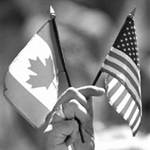In this excerpt from Uneasy Neighbo(u)rs: Canada, the USA and the Dynamics of State, Industry and Culture, authors David T. Jones and David Kilgour explain that, although Canada and the U.S. have similar histories, they have developed different approaches to the rest of the world
The Ottawa Citizen
Published: Saturday, October 20, 2007
Ever since Canada evolved into something other than a colony of Great Britain, it has puzzled over its relationship with the United States. The phenomenon can be viewed as akin to an accordion being played: regularly moving/squeezing closer and then changing harmony by pulling back. It is also analogous to the psychologist's approach/avoidance" concept in which, as two bodies move closer, the forces to be overcome increase and push them apart again.
The Canada-U.S. bilateral relationship has been characterized by innumerable adages and pithy descriptive phrases. One of the most trenchant is attributed to John Bartlet Brebner: "Americans are benignly ignorant of Canada. Canadians are malevolently well informed about the United States." Another suggests that there is the sociological equivalent of a one-way mirror at the border. Canadians looking south see Americans as they are, but Americans looking north see only a reflection of themselves.
One might also say that geography has made us neighbours; history has made us allies; economics has made us partners; but we are friends by choice. More cynically, "we are best friends, like it or not"; if so, we are certainly in a "not" portion of the cycle as the relationship moves further into the 21st century, although many Canadians would say that the hostility is to the Bush administration rather than to the American people.

Rather than belabouring differences, another approach to examining our countries is to suggest that we are "alternative North Americas." Both Canada and the United States have similar political and historical origins in the United Kingdom, a commitment to free market capitalism to differing degrees, and a demography that began with indigenous tribes but now reflects worldwide immigration. Both have technologically sophisticated, well-educated populations. And each is attempting to find solutions for basic questions of the 21st century: the most effective mechanisms of political expression for two peoples enjoying essentially the same human rights and freedoms; the most rational and effective manner to secure the safety of the population from external threat; the delivery of health services and care of the elderly; the education of children in a manner permitting them to address problems 50 years into the future; the exploitation of natural resources without significant environmental damage; the balance between the freedom and privacy of individual citizens with the societal objective of safety from violence; and creating the conditions for equality of opportunity -- if not equality of outcome.
As a superpower, the United States has wider -- indeed global -- interests and a greater ability to implement and defend its interests than does Canada. While Washington is willing to consult with others and even modify elements of its approaches and objectives if given convincing reasons to do so, it remains willing to act on its perception of its interests -- alone, if necessary. Its willingness to act unilaterally reflects its ability to do so. Canada believes that significant international action -- particularly force of arms -- can only be taken in conjunction with allies and, if possible, with the sanction of the United Nations. By a systematic although somewhat absent-minded long-term neglect of its defense establishment, Canada virtually abdicated from significant military action. It is still to be determined whether Canada's venture into a NATO-Afghanistan commitment is a one-off exercise or a return to an earlier era. The intensely divided citizenry and very narrow May 2006 parliamentary endorsement of a continued participation suggests the former as Canada's future.
Consequently, to be able to defend and implement its global interests, the U.S. maintains a massive defense establishment at high expense and employing the most advanced technology both for offense and defense. In contrast, Canada's armed forces are marginal; they are now far below what its economy could maintain or what comparable countries do support. In effect, Canada has subcontracted its defense to the United States, making the actuarial judgment that it could never defend itself against attack from the south, but that any external threat to Canada would also threaten the United States -- and the U.S. would have to address it. Hence, Canada can be defended badly at great expense or badly at little expense. With health care being more popular than a modernized military, the Canadian choice has been an antiquated military and it is likely to remain so, regardless of temporary upgrades of equipment or personnel.
Excerpted from From Uneasy Neighbo(u)rs, Wiley, $33.99
© The Ottawa Citizen 2007
